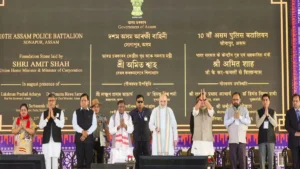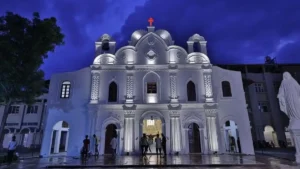The vibrant Mamani Ethnic Food Festival of Purig, held annually at Heritage Village Styangkung Barsoo, stands as a triumphant celebration of culinary diversity, cultural heritage, and community unity. Organized by the Himalayan Cultural Heritage Foundation in collaboration with Nyarpa Committee Styangkung, this annual festival has become a cornerstone in preserving and reviving the rich traditions of the Ladakh region.
Culinary Delights from Different Villages
The festival featured six food stalls, each representing different villages, presenting a collective array of 35 traditional dishes. From the soul-warming Thugpa to the exquisite Popot and a variety of bread such as Hrtsrap Khur, Mamani showcased the authentic flavors of the region. Originally predating to the period of Bonism, Mamani was a time for worshipping spirits called Lha, and over the years, it has evolved into a communal celebration fostering bonds among households and communities.
Cultural Activists and Heritage Preservation
Cultural activists, notably Anayat Ali Shotopa and the Himalayan Cultural Heritage Foundation, have played a crucial role in reviving and formalizing this cultural extravaganza. Mamani includes an annual competition, judging dishes on taste, presentation, and variety. Notable figures such as Chief Guest Brigadier Vinay Bahl and Guest of Honor Purgi poet Syed Hadi Shah Aga graced the occasion, emphasizing the festival’s significance in cultural preservation.
Recognition and Awards
The Yokma Group clinched the first prize, followed by the Aziz Group in the second position, and the Yokma Akhone group in the third position. Consolation prizes were awarded to the groups Staykborig, Singay, and Akhonepa. The festival paid tribute to notable historians and academics, including Aba Sonam Punchok Achinathang. Special appreciation was awarded to contributors such as Mohd Sharif, Owner of AMSM Heritage Museum, Ngyerpa Committee Styangkung, and Nasir Hussain Zaidi for their dedication to the revival and preservation of Culture and Heritage.
Festival’s Impact on Tourism
Mamani stands as a testament to the commitment of Ladakh communities to preserve their cultural heritage. The festival not only celebrates traditions but also promotes communal harmony, bringing together diverse communities in a shared celebration of their heritage. Dr. Sonam Wongchuk, Founder HCHF, highlighted the festival’s inclusion in UT Ladakh’s tourism calendar, noting its success in reviving over 39 dishes since its modest start in 2016.
Moving Forward: Shina Belt in Budgam Village for Tramo
Anayat Ali Shotopa, Cultural Activist, announced the festival’s movement to Shina Belt in Budgam Village for Tramo next year. This move emphasizes the motive to engage local people in the preservation of local dishes, dress, and culture. The motive behind the celebration is to involve the local population in safeguarding their unique culinary and cultural heritage.
Important Questions Related to Exams
1. What is the primary objective of the Mamani Ethnic Food Festival?
2. Which group clinched the first prize at the festival?
Kindly share your responses in the comment section!!




 Punjab Launches ‘Meri Rasoi’ Scheme: Fre...
Punjab Launches ‘Meri Rasoi’ Scheme: Fre...
 Amit Shah Lays Foundation of 10th Assam ...
Amit Shah Lays Foundation of 10th Assam ...
 475 Year Old Vasai Cathedral Wins UNESCO...
475 Year Old Vasai Cathedral Wins UNESCO...








